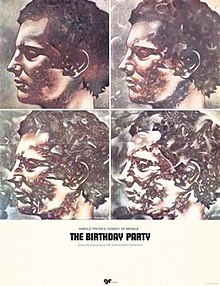
The Exorcist is a 1971 horror novel written by American writer William Peter Blatty and published by Harper & Row. The book details the demonic possession of eleven-year-old Regan MacNeil, the daughter of a famous actress, and the two priests who attempt to exorcise the demon. The novel was the basis of a highly successful film adaptation released two years later, whose screenplay was also written and produced by Blatty. More movies and books were eventually added to The Exorcist franchise.
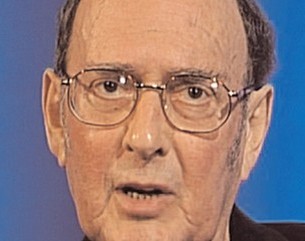
Harold Pinter was a British playwright, screenwriter, director and actor. A Nobel Prize winner, Pinter was one of the most influential modern British dramatists with a writing career that spanned more than 50 years. His best-known plays include The Birthday Party (1957), The Homecoming (1964) and Betrayal (1978), each of which he adapted for the screen. His screenplay adaptations of others' works include The Servant (1963), The Go-Between (1971), The French Lieutenant's Woman (1981), The Trial (1993) and Sleuth (2007). He also directed or acted in radio, stage, television and film productions of his own and others' works.

Joseph Walton Losey III was an American theatre and film director, producer, and screenwriter. Born in Wisconsin, he studied in Germany with Bertolt Brecht and then returned to the United States. Blacklisted by Hollywood in the 1950s, he moved to Europe where he made the remainder of his films, mostly in the United Kingdom. Among the most critically and commercially successful were the films with screenplays by Harold Pinter: The Servant (1963) and The Go-Between (1971).

The Ninth Configuration is a 1980 American psychological drama film written, produced, and directed by William Peter Blatty, in his directorial debut. It is the second installment in Blatty's "Trilogy of Faith" after The Exorcist (1973), and followed by The Exorcist III (1990). The film is based on Blatty's 1978 novel The Ninth Configuration, which was itself a reworking of his 1966 novel Twinkle, Twinkle, "Killer" Kane! The initial 1966 publication of the novel featured an exclamation mark at the end of the title, while all subsequent publications saw it removed.

William David Friedkin was an American film, television and opera director, producer, and screenwriter who was closely identified with the "New Hollywood" movement of the 1970s. Beginning his career in documentaries in the early 1960s, he is best known for his crime thriller film The French Connection (1971), which won five Academy Awards, including Best Picture and Best Director, and the horror film The Exorcist (1973), which earned him another Academy Award nomination for Best Director.

Accident is a 1967 British drama film directed by Joseph Losey. Written by Harold Pinter, it is an adaptation of the 1965 novel Accident by Nicholas Mosley. It is the third of four Losey–Pinter collaborations; the others being The Servant (1963), Modesty Blaise (1966) and The Go-Between (1971). At the 1967 Cannes Film Festival, Accident won the Grand Prix Spécial du Jury award. It also won the Grand Prix of the Belgian Film Critics Association.
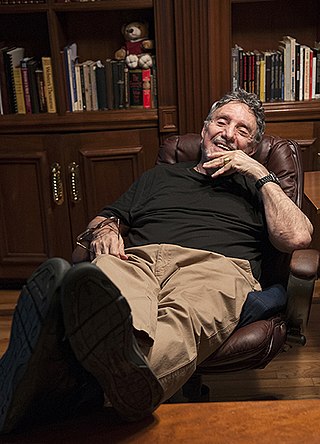
William Peter Blatty was an American writer, director and producer. He is best known for his 1971 novel, The Exorcist, and for his 1973 screenplay for the film adaptation of the same name. Blatty won an Academy Award for Best Adapted Screenplay for The Exorcist, and was nominated for Best Picture as its producer. The film also earned Blatty a Golden Globe Award for Best Motion Picture – Drama as producer.
Amicus Productions was a British film production company, based at Shepperton Studios, England, active between 1962 and 1977. It was founded by American producers and screenwriters Milton Subotsky and Max Rosenberg.
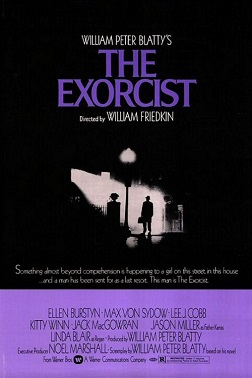
The Exorcist is a 1973 American supernatural horror film directed by William Friedkin from a screenplay by William Peter Blatty, based on his 1971 novel. The film stars Ellen Burstyn, Max von Sydow, Jason Miller, and Linda Blair. The story follows the demonic possession of a young girl and her mother's attempt to rescue her through an exorcism by two Catholic priests.

The Servant is a 1963 British drama film directed by Joseph Losey. It was written by Harold Pinter, who adapted Robin Maugham's 1948 novella. The Servant stars Dirk Bogarde, Sarah Miles, Wendy Craig and James Fox.

The Birthday Party (1957) is the first full-length play by Harold Pinter, first published in London by Encore Publishing in 1959. It is one of his best-known and most frequently performed plays.

Patrick George Magee was a Northern Irish actor. He was noted for his collaborations with playwrights Samuel Beckett and Harold Pinter, sometimes called "Beckett's favourite actor," as well as creating the role of the Marquis de Sade in the original stage and screen productions of Marat/Sade.

Father Damien "Demis" Karras, SJ, is a fictional character from the 1971 novel The Exorcist, its 1983 sequel Legion, one of the main protagonists in the 1973 film The Exorcist, and a supporting character in The Exorcist III, the 1990 film adaptation of Legion. He is portrayed by Jason Miller.

The Go-Between is a 1971 British historical drama film directed by Joseph Losey. Its screenplay by Harold Pinter is an adaptation of the 1953 novel The Go-Between by L. P. Hartley. The film stars Julie Christie, Alan Bates, Margaret Leighton, Michael Redgrave and Dominic Guard. It won the Palme d'Or at the 1971 Cannes Film Festival.

Pazuzu is a fictional character who is the main antagonist in The Exorcist horror novels and film series, created by William Peter Blatty. Blatty derived the character from Assyrian and Babylonian mythology, where the mythic Pazuzu was considered the king of the demons of the wind, and the son of the god Hanbi. In The Exorcist, Pazuzu appears as a demon who possesses Regan MacNeil.
Remembrance of Things Past is the 2000 collaborative stage adaptation by Harold Pinter and director Di Trevis of Harold Pinter's as-yet unproduced The Proust Screenplay (1977), a screen adaptation of À la recherche du temps perdu, the 1913–1927 seven-volume novel by Marcel Proust.
The Dreaming Child is a screenplay by Harold Pinter (1930–2008), the 2005 Nobel Laureate in Literature, which he completed in 1997 and published in volume 3 of his Collected Screenplays (2000). It has not yet been filmed but was produced as a radio play by Feelgood Films for BBC Radio Four's Unmade Movies series in 2015. It is an adaptation of the short story "The Dreaming Child" by Danish author Karen Blixen. Pinter's manuscripts for this work are housed in The Harold Pinter Archive in the British Library.
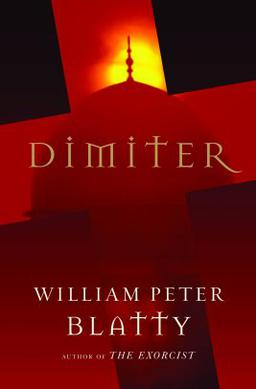
Dimiter is a novel by William Peter Blatty, released on March 16, 2010, through Forge Books. Publishers Weekly awarded Dimiter a starred review, calling it "a beautifully written, haunting tale of vengeance, spiritual searching, loss, and love".

The Exorcist III is a 1990 American psychological horror film written for the screen and directed by William Peter Blatty, based on his 1983 novel Legion. It is the third installment in The Exorcist film series, and the final installment in Blatty's "Trilogy of Faith" after The Ninth Configuration (1980). The film stars George C. Scott, Ed Flanders, Jason Miller, Scott Wilson, Nicol Williamson, and Brad Dourif.

The Exorcist is an American horror media franchise that originated with William Peter Blatty's 1971 horror novel of the same name and most prominently featured in a 1973 film adaptation of the novel, and many subsequent prequels and sequels. All of these installments focus on fictional accounts of people possessed by Pazuzu, the main antagonist of the series, and the efforts of religious authorities to counter this possession.
